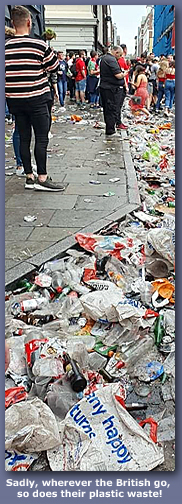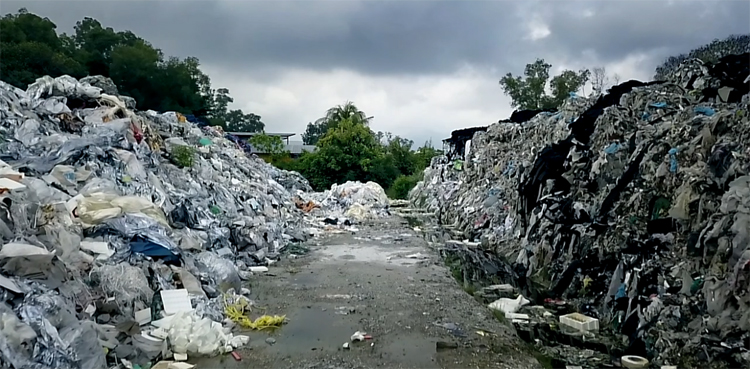 Despite the effort made to recycle as much waste as possible by the public through their bin collections, it seems according to on-going reports over the last couple of years, that some recycling companies that local councils use; are NOT recycling plastic waste in this country!
Despite the effort made to recycle as much waste as possible by the public through their bin collections, it seems according to on-going reports over the last couple of years, that some recycling companies that local councils use; are NOT recycling plastic waste in this country!
Rather, according figures issued by the National Audits Office in July of last year, two thirds of plastic packaging waste is being sent overseas on the basis that it will be recycled and turned into new products. However, concerns have been raised that in reality much of it is being dumped in land-fill sites from Turkey to Malaysia.
Every year, British households throw 22m tons of waste into the bin. Recycling rates have stagnated at about 44% and the UK is unlikely to hit its target of 50% by 2020.
Britain does not have the requisite infrastructure to recycle its own plastic waste, so it is sent abroad.
Since 2002, the amount of UK plastic waste sent overseas to countries including China, Turkey, Malaysia and Poland has increased sixfold – accounting for half of the packaging reported as recycled last year.
But until the media catches up with the extent of the problem and reports accurately about the UK's lack of resources to actually recycle it's waste without sending it abroad, the British public have a false sense of their own recycling security.
TV programme such as BBC's Blue Planet series have electrified the issues in the minds of the public, and so too has a BBC documentary broadcast this week which has caused outrage and embarrassment to one English council.
The discovery was made by Environmental campaigner Hugh Fearnley-Whittingstall discovered that UK’s plastic waste is being sent on a world tour, in this case from Braintree, England to Kuala Lumpur, Malaysia to during filming for a BBC documentary examining the UK's relationship with plastic.
The show was broadcast on BBC One this week, (10th June) where the presenter was seen wading through plastic bags and rubbish which had been sent to Malaysia from the UK.
While searching through this unlicensed and illegal site, based 250km north of Kuala Lumpur, the TV presenter came across a recycling bag clearly labeled Braintree District Council.
The bag was found among a host of other imported plastics from the UK, which formed a 5 METRE pile of plastic waste covering the size of a large football field; that most UK households believed had been dealt with in our own country.
Braintree council has since defended how it processes plastic waste following the discovery of one of it’s recycling bags was found dumped in an unlicensed landfill in Malaysia, by putting together a Q&A for viewers and residents in response to the show.
One of the shocking things that can be read in this Q&A is that the plastic bag concerned as over four years old!
This is a perfect example of how plastic bags do not decompose, so much so that the identifying logos and text on the plastic can easily be read.

The councils also stated that their recycling contractor, Viridor, has confirmed that Braintree Council’s recycling is collected in plastic bags and the dry mixed recyclate is retained and sorted within the United Kingdom at either its Great Blakenham or Crayford Materials Recycling Facilities.
Once the material has been separated it is sold within the UK and also exported abroad where it is used as a recyclable commodity in the manufacturing industry.
Viridor works with Environment Agency-accredited and licensed processing facilities when any material, such as recycling bags, is sent for export. The Braintree District bags which were, in the past, sent to Malaysia were sold as an “end-of-waste product” which means the material was to be reprocessed to produce a pellet or flake and reused in manufacturing as a recyclable material.
Any instances where material sent to an EA-accredited facility may not been treated as end-of-waste will be investigated by Viridor.
Earlier this year, Claire Shrewsbury, from the recycling body, Wrap, told BBC News:
"The time has come for the UK to take more responsibility for its own recovered materials, and move towards a circular system for plastics and other materials.
"There is a global market for high quality resource exports to countries that manufacture products, and this is something the UK should explore.
This will require fundamental change from all of us. And that means regulatory transformation, collaborative industry action, together with citizen behaviour change."
Ms Shrewsbury aims her comments at anyone who buys stuff and throws packaging away.
That's all of us.

Source: BBC News, The Guardian, Braintree and Witham Times, The Independent